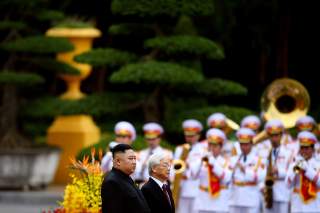Vietnam Proves Valuable During Second North Korea Summit
The second U.S.-North Korea summit did not end with an agreement, but Hanoi—the host of summit—has left a lasting impact.
Last year, at a tavern in Washington, DC, a man asked me if the Vietnam War had ended. His questions is an example of the awareness that many Westerners have about Vietnam. Notwithstanding the legacy of the Vietnam War, in late February all of the world’s eyes returned to Vietnam where U.S. President Donald Trump and North Korea leader Chairman Kim Jong-un conducted their second summit.
Over the past several years, Vietnam has executed an effective and multilateral foreign policy, especially with United States. In November 2017, President Trump wrapped up a trip to Asia. Vietnam was his first destination in Southeast Asia. Trump is the second president (Richard Nixon was the first) to visit Vietnam in the first year of the first term, and the first POTUS to have visited Vietnam before the Philippines—a longtime ally of the United States. A month after Trump’s trip, in December 2017, U.S. Pacific Air Forces Commander Gen. Terrence J. O’Shaughnessy was in the cockpit of Su-30MK2 at Bien Hoa Air Base. The Su-30MK2 is the most advanced fighter aircraft of the Vietnam People’s Air Force, and the United States is a “former enemy” of Vietnam. The image of General O’Shaughnessy in Su-30MK2 had strong symbolism as it illustrated the growing closeness of the Vietnam and the United States. Later, in March 2018, the aircraft carrier USS Carl Vinson and its escort made a port call to Da Nang in Vietnam. This further bolstered the image of a cooperative relationship.
Vietnam has deepened its cooperation with the United States and with South Korea and Japan, too. It also retains a cordial relationship with North Korea, which allows Vietnam to act as a bridge to contribute to peace on the Korean Peninsula. Japanese-Vietnamese cooperation has expanded over the past several years. For example, many Japanese naval ships have called on Vietnamese ports in recent years. In 2017, the helicopter destroyer JS Izumo (DDH-183)—the biggest warship of Japan since ending World War II—conducted its first overseas voyage when it visited Vietnam. Other warships of Japan have docked in Vietnam. In Sept 2018, the South Korean Navy's destroyer, ROKS Moon Mu the Great (DDH-976), docked in Da Nang for in four-day visit to Vietnam. In this voyage, the destroyer ROKS Moon Mu the Great upset China by sailing close to disputed Chinese territory in the South China Sea.
Previous presidents have failed to diffuse the tensions on the Korean Peninsula and find a diplomatic solution to normalizing North Korea, in part because their solutions were linked to Chinese assistance. Trump believes that this is his chance to have a lasting legacy.
The challenge for the transactional Trump is that any effective effort to solve the North Korean problem will require China’s participation. This will be difficult with the escalation in Sino-U.S. tensions associated with the trade war. Washington should not expect aid from Beijing in dealing with Pyongyang, but it should be cautious with Tokyo and Seoul, too, because Trump’s trade diplomacy may align their interests with Beijing.
Throughout this period of diplomatic instability, Hanoi has maintained a cordial and close relationship with Pyongyang. At the same time, there Tokyo and Seoul have developed a deeper relationship. As a result, Vietnam has inadvertently become a hub of diplomatic connectivity between Washington, Seoul, Tokyo and Pyongyang.
It may be many years before Washington and Pyongyang forge a diplomatic agreement. The failure of Washington and Pyongyang to come to any agreement in Hanoi last month may be an indication that it will take time for the two countries to develop a stronger relationship. Nevertheless, the summit location and outcome has presented an innovative diplomatic approach to achieving progress in U.S.-North Korea relations. It has shown that Vietnam can play a new role on the international stage through its contributions to peaceful dialogue and proactive, constructive diplomacy at the second summit between North Korea and the United States.
Ngo Minh Tri is a managing editor of the Thanh Niên Newspaper based in Ho Chi Minh City, Vietnam. He conducts research on international security affairs, with a focus on Asian security issues.
Image: Reuters

